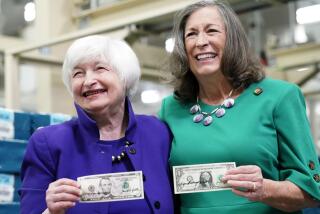Alan Greenspan praises Fed chair nominee Janet Yellen as ‘very bright’
WASHINGTON -- Former Federal Reserve Chairman Alan Greenspan on Wednesday praised Janet L. Yellen, President Obama’s nominee to be the next central bank chief, calling her “very bright” and saying he often would go to her to explain academic economics developments he didn’t understand.
“I understand 90%, 95% of what they’re writing,” Greenspan told CNBC, referring to academic economists. “But there’s a small amount which I don’t know and I want to know. And I often found that I would go to Janet.”
“When I didn’t know it, she did. And she explained it to me,” Greenspan said of Yellen, the current Fed vice chair and a former UC Berkeley economist.
QUIZ: How well do you understand the Fed stimulus?
Greenspan served about 2 1/2 years on the Fed board with Yellen, during her first stint as a central bank governor from 1994 through 1997. They did not always get along.
Yellen was among a handful of Fed governors who took on Greenspan in 1995 regarding a rule on the way banks calculated interest rates on bank deposits.
Yellen was concerned that consumers were being misled about the true interest rate they were earning, and she successfully helped push through an amendment to a Fed regulation over Greenspan’s opposition. It was one of only two votes he lost in more than 18 years as Fed chairman.
“She’s a very bright lady. I think she will surprise everybody” in a positive way, Greenspan said of Yellen on Wednesday.
Obama nominated Yellen this month to succeed Ben S. Bernanke, whose second four-year term as chairman expires Jan. 31. If confirmed, shed would be the first Democrat to lead the Fed since Paul Volcker stepped down in 1987.
Greenspan, a Republican, replaced Volcker. Bernanke took over for Greenspan in 2006.
ALSO:
Army lets air out of battlefield spyship project
As many as 300,000 jobless affected by state software snags
More to Read
Inside the business of entertainment
The Wide Shot brings you news, analysis and insights on everything from streaming wars to production — and what it all means for the future.
You may occasionally receive promotional content from the Los Angeles Times.











